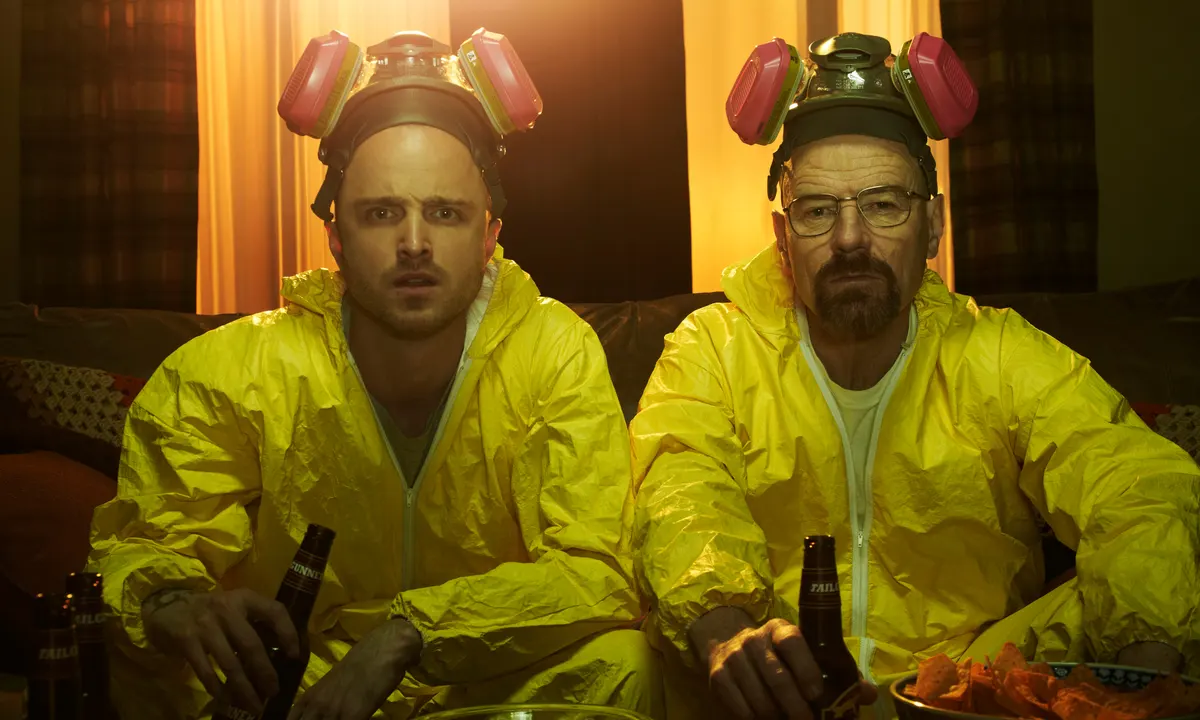Breaking Bad: A Masterpiece of Intensity, Morality, and Character Transformation

“Breaking Bad” is an American television series aired from 2008 to 2013. Created by Vince Gilligan, the show follows the story of Walter White, a high school chemistry teacher turned methamphetamine manufacturer, and his former student, Jesse Pinkman, as they enter the dangerous world of drugs and crime. Methamphetamine is an amphetamine derivative, trade name Methedrine, used in the form of a crystalline hydrochloride; which is used as a stimulant to the nervous system and as an appetite suppressant.
The series is known for its gripping storyline, complex characters, and intense performances. Bryan Cranston portrays Walter White, a mild-mannered chemistry teacher who turns to cooking and selling methamphetamine after being diagnosed with terminal cancer. Aaron Paul plays Jesse Pinkman, a small-time methamphetamine manufacturer and dealer who becomes Walter’s business partner and surrogate son-like figure.
Throughout the show, Walter and Jesse get involved with various criminal organizations and face numerous challenges as they try to establish their drug empire. The series explores themes of morality, the consequences of choices, and the transformation of its characters.
“Breaking Bad” received critical acclaim and has been widely regarded as one of the greatest television series of all time. It won numerous awards, including 16 Primetime Emmy Awards. The show also spawned a prequel spin-off called “Better Call Saul,” which focuses on the character Saul Goodman, who becomes the lawyer for Walter and Jesse in “Breaking Bad.”
The essence of the story:
The central theme of “Breaking Bad” revolves around the transformation of an ordinary man, Walter White, into a morally compromised and ruthless criminal. The series explores the consequences of Walter’s choices as he descends into the world of drugs and crime.
One of the primary themes is the concept of moral ambiguity. Walter starts as a sympathetic character driven by desperation to secure his family’s financial future after being diagnosed with cancer. However, as he becomes more deeply involved in the drug trade, his actions become increasingly questionable and morally reprehensible. The series challenges viewers to examine the boundaries of right and wrong and raises questions about the nature of human morality.
Another theme is the consequences of unchecked ambition and the allure of power. Walter’s initial motivations may be rooted in providing for his family, but his journey takes him on a path of power and control. As he gains more influence in the drug trade, he becomes consumed by his ego and the desire for dominance, leading to devastating consequences for those around him.
“Breaking Bad” also delves into the concept of identity and self-discovery. Walter transforms from a meek and overlooked high school teacher into a notorious drug lord known as Heisenberg. Through this transformation, he explores his own capabilities and confronts his deepest fears and desires. The series highlights how our actions shape our identities and how the pursuit of power can corrupt and distort one’s sense of self.
Furthermore, “Breaking Bad” touches on the theme of the destructive nature of secrets and lies. Walter’s double life strains his relationships with his family, friends, and associates. His web of lies and deceit creates an atmosphere of tension and paranoia, ultimately leading to devastating consequences for himself and those he cares about.
The themes of moral ambiguity, the consequences of ambition, identity, and the destructive power of secrets and lies are intricately woven throughout the narrative of “Breaking Bad.” The series challenges viewers to confront their own moral compass and consider the choices we make when faced with difficult circumstances.
Riveting character transformation:
“Breaking Bad” stands as a testament to the power of character transformation within the realm of television. At its core, the series captivates audiences with its exploration of the intricate metamorphosis of its protagonist, Walter White. The transformation of Walter from a meek, law-abiding chemistry teacher to a formidable drug lord named Heisenberg is a master class in character development, leaving an indelible mark on the landscape of television storytelling.
Walter White’s journey begins as a sympathetic figure; a man dealt a harsh blow by life’s circumstances. However, as the series unfolds, we witness a gradual erosion of his moral boundaries. It is this slow descent that makes his transformation all the more compelling. Breaking Bad challenges the viewers’ perceptions of good and evil, forcing them to confront the uncomfortable reality that anyone is capable of straying from the path of righteousness.
As Walter delves deeper into the methamphetamine trade, a new persona emerges – Heisenberg. This alter ego represents Walter’s liberation from societal constraints and an embodiment of his repressed desires. Heisenberg embodies power, control, and the audacity to defy conventional norms. Walter’s transformation into Heisenberg highlights the allure of dominance and the intoxicating effects of embracing one’s darker impulses.
Walter’s transformation raises poignant ethical questions, forcing viewers to confront their own moral compass. Can a man driven by desperation be excused for his descent into criminality? Does the end ever justify the means? “Breaking Bad” navigates these dilemmas with finesse, presenting a complex protagonist whose actions blur the lines between hero and villain. The series challenges our preconceived notions of right and wrong, leaving us pondering the nature of morality long after the final credits roll.
While Walter’s transformation grants him power and a taste of the life he had always desired, it comes at an enormous cost. The collateral damage caused by his choices weighs heavily on the narrative. Relationships fracture, lives are lost, and innocence is irreversibly corrupted. The series reinforces the notion that transformation often exacts a steep toll, underscoring the repercussions of unchecked ambition and the destructive ripple effect of one’s choices.
“Breaking Bad” masterfully crafts an unforgettable character transformation that transcends the confines of traditional storytelling. Walter White’s evolution from a timid chemistry teacher to a morally compromised drug lord serves as a cautionary tale, provoking profound introspection among viewers. The series highlights the fluid nature of morality, the seduction of power, and the ramifications of embracing one’s darker instincts. Through the lens of Walter White’s journey, “Breaking Bad” has forever reshaped the landscape of character-driven narratives, leaving an indelible mark on the annals of television history.
Intense storytelling:
The storytelling in “Breaking Bad” is undeniably intense and gripping. The series maintains a consistently high level of tension and suspense throughout its run, keeping viewers on the edge of their seats. Here’s an exploration of the various elements that contribute to the intense storytelling of “Breaking Bad”:
Pacing: The show expertly balances slow-burning character development with heart-pounding moments of action. The pacing allows for a deep dive into the characters’ motivations and inner struggles, while also building anticipation for explosive confrontations and unexpected twists.
Character-driven narrative: The intense storytelling stems from the compelling and complex characters at the core of the series. Each character is meticulously crafted, with their own motivations, flaws, and arcs. The conflicts that arise between the characters drive the plot forward and create a palpable sense of tension.
Moral ambiguity: “Breaking Bad” delves into the gray areas of morality, blurring the lines between right and wrong. This moral ambiguity adds an extra layer of intensity to the storytelling as viewers are constantly confronted with the characters’ questionable choices and the consequences that follow.
High-stakes consequences: The decisions made by the characters in “Breaking Bad” often have life-and-death consequences. As the story progresses, the stakes escalate, and the characters find themselves entangled in dangerous situations, facing the risk of exposure, violence, and loss. This constant threat amplifies the intensity of the storytelling.
Emotional depth: The emotional impact of “Breaking Bad” is a significant aspect of its intensity. The series explores themes of desperation, betrayal, guilt, and the consequences of one’s actions. The emotional turmoil experienced by the characters resonates with viewers, creating an immersive and intense viewing experience.
Cinematic craftsmanship: The technical aspects of the show contribute to its intensity. The cinematography, use of lighting and color, sound design and editing, all work together to create a visually stunning and atmospheric narrative. The attention to detail and the visual cues enhance the emotional impact and heighten the intensity of key moments.
The combination of these factors results in an intense storytelling experience that keeps viewers emotionally invested and engaged. “Breaking Bad” is renowned for its ability to create and sustain tension, leaving a lasting impression on its audience.
Legacy and impact:
Breaking Bad’s impact on popular culture cannot be overstated. It redefined the possibilities of storytelling on television, paving the way for a new era of complex and character-driven dramas. Its influence can be seen in subsequent series that embraced morally ambiguous protagonists and intricate narrative arcs. Breaking Bad’s iconic moments, such as the “I am the one who knocks” speech and the explosive series finale, have become part of television folklore. The series’s legacy lies not only in its numerous awards and accolades but also in its ability to resonate deeply with audiences worldwide, transcending the medium to become a cultural phenomenon.
Breaking Bad is a tour-de-force of television storytelling, where each episode unfolds with nail-biting tension and intricate character development. The performances are nothing short of extraordinary, with Bryan Cranston and Aaron Paul delivering career-defining portrayals. Its exploration of morality, ethical dilemmas, and the consequences of choice raises profound questions that linger in the mind long after the series concludes. Breaking Bad stands as a testament to the power of television as an art form, solidifying its place among the greatest shows of all time. It is an intense, thought-provoking, and unforgettable journey that deserves every ounce of its acclaim.
Abinash Gajurel is a student and animation enthusiast.














